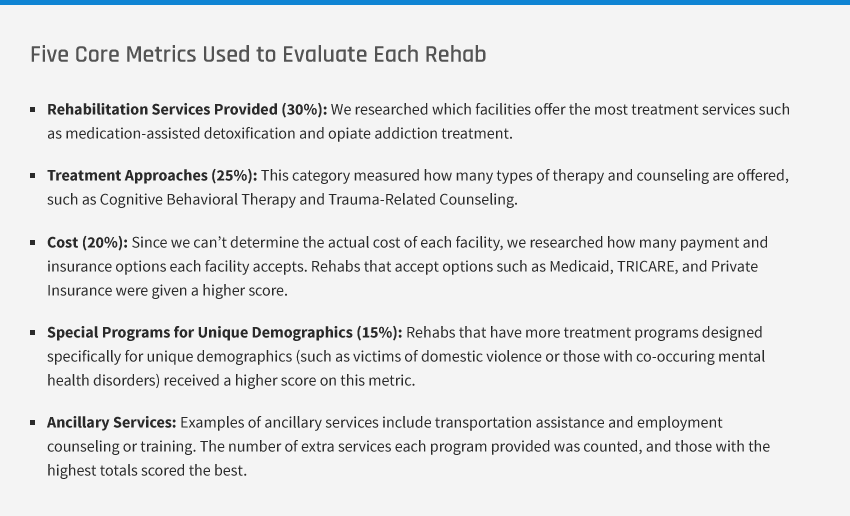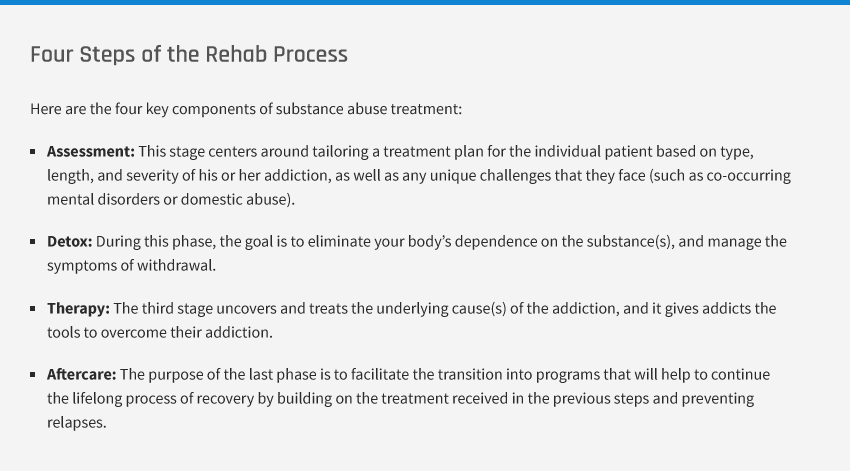Alcohol, Drug, and other Rehab Centers in Oklahoma City, OK
TABLE OF CONTENTS
Getting Help
What to Consider When Choosing a Rehab Center
When thinking about which rehabilitation programs and treatment options to explore, some important questions you should consider asking include:
- Which service setting is best for me? Read the following guides to understand residential inpatient programs and outpatient programs.
- Which specialized rehab programs do I need? Read about the differences between holistic rehabs, rehabs for dual diagnosis, and programs only for alcohol and drug detox.
- How long should I stay? Consider the differences between a shorter rehab length (30 days) or a longer-term option (60, 90, or 120+ days).
There are various factors that will impact your rehab options, such as the severity of your addiction, your financial position, and your unique personal situation.
For more information on how to make all of these decisions, read our guide to Choosing the Right Rehab.
The Best Rehabs in Oklahoma City, OK
The cost of rehab can be high, depending on your needs and location. Whether or not you have insurance, there are ways for you to get help breaking free of your addiction. According to the Substance Abuse and Mental Health Administration (SAMHSA), there are 35 substance abuse treatment centers in the Oklahoma City area. Many of these organizations are on a mission to provide substance abuse recovery services to residents, regardless of their financial status. Of these 35 centers, Catalyst Behavioral Services Community House has received the highest overall scores based on our five core metrics.

We used these five core metrics to evaluate the quality of each facility. For more information, feel free to read a full breakdown of our filtering process and ranking methodology.
1. Catalyst Behavioral Services Community House
Catalyst Behavioral Services Community House earned the top spot in our rankings, scoring 7.8 points out of 10 possible points for its high-quality residential treatment services. The 55-bed co-educational treatment center is located in the heart of Oklahoma City, and its program features a detailed assessment and medication-assisted treatment services paired with individual, group, and family counseling. All evidence-based treatment plans are tailored to the individual and can address co-occurring mental health and social issues. Additionally, each weekend the center offers a family day that encourages family members of patients to understand and take part in their treatment progression.
The center offers comfortable amenities, such as semi-private rooms, dietician-approved meals, and entertainment rooms. Physical fitness is also prioritized at the center, with volleyball, basketball, and an exercise area available for clients. It offers specialized groups for specific genders and LGBT clients, contributing towards its high score for special programs for unique populations. Its licensed staff is comprised of full-time therapists, physicians, psychiatrists, nurses, and case managers who work together to provide a personalized treatment plan and a multitude of ancillary services – ranging from tobacco cessation to employment counseling and training to treatment for non-substance abuse disorders, such as gambling – for each patient.
Community House has provided addiction treatment in Oklahoma City for over forty years, and the center is recognized and accredited by C.A.R.F (Commission on Accreditation of Rehabilitation Facilities). It accepts Medicare, Medicaid, and IHS/Tribal/Urban (ITU) funds, as well as most private health insurance plans. For clients without insurance coverage, it offers affordable rates on a sliding fee scale that can be determined by a free eligibility screening.
- Rehabilitation Services Provided: 6.68
- Treatment Approaches: 10
- Cost: 5
- Special Programs for Unique Demographics: 8.52
- Ancillary Services: 10
2. NorthCare of Oklahoma City
NorthCare of Oklahoma City provides regular and intensive outpatient treatment and detoxification services for men and women in Oklahoma City. The center received an overall score of 6.9 points out of 10 points for its comprehensive and cost-effective substance abuse rehabilitation services. After a comprehensive addiction and mental health assessment, the gender-specific treatment programs integrate medication-assisted treatment; individual, group, and family therapy; trauma recovery groups, case management, and wellness classes for opioid and alcohol use disorder. Many therapeutic modalities are used at the center, including cognitive behavioral therapy, dialectical behavior therapy, the Matrix Model approach, relapse prevention, anger management, and more. Additionally, NorthCare offers a wealth of ancillary services, such as assistance with obtaining social services, housing assistance, domestic violence services, social skills development, and peer support.
NorthCare offers specialized programs for LGBT individuals, veterans, and women. In regards to the latter, the Family Treatment Center (FTC) program is uniquely designed for women with co-occurring substance use and mental health disorders. In this program, mothers and children can reside together while mothers are on the path to a sustained recovery. This program features 12-Step meetings and psychoeducational groups that cover topics such as trauma in addiction, relationships, parenting, health and wellness, and other issues specific to women.
The center accepts Medicare, Medicaid and other state-financed health insurance, TRICARE, and private health insurance. Self-payment is also accepted on a sliding fee scale based on income and other factors.
- Rehabilitation Services Provided: 5.01
- Treatment Approaches: 10
- Cost: 7.5
- Special Programs for Unique Demographics: 4.97
- Ancillary Services: 6.17
3. The Recovery Center (TRC)
The Recovery Center (TRC) is a 48-bed treatment facility that scored 5 out of 10 points for its recovery-oriented substance abuse services. It provides a full continuum of care for adult men and women, including regular and intensive outpatient treatment, medically-supervised detoxification, family services, case management services, and aftercare planning. After a thorough intake evaluation, clients can expect drug screenings, substance abuse education; individual, group, and family therapy; peer support and wellness services, recreational activities, and much more. Therapeutic approaches such as 12-step facilitation, cognitive behavioral therapy, motivational interviewing, relapse prevention, and anger management are utilized to change negative thoughts and behaviors associated with substance abuse and ensure a lasting recovery.
In addition to its comprehensive substance abuse treatment services, a wide spectrum of ancillary services are offered. These services include social skills development, transportation assistance, mentoring, housing services, early intervention for HIV, and domestic violence services, to name just a few. In general, the specific treatment services and length of stay of the program are based on an individual assessment that takes into account each client’s needs and unique patterns of abuse.
The center accepts federal funding for substance abuse programs, Medicaid, and private health insurance. State reimbursement services are offered on a sliding fee scale for eligible individuals depending on annual income and other factors. Financial assistance programs are also available for eligible individuals.
- Rehabilitation Services Provided: 8.35
- Treatment Approaches: 3.34
- Cost: 3.75
- Special Programs for Unique Demographics: 0
- Ancillary Services: 9.53
Top-Rated, Low-Cost Treatment Centers in the Oklahoma City Area
| Rank | Rehab | Total Score | Contact Information |
| #1 | Catalyst Behavioral Services Community House | 7.8 | 1501 NE 11th Street Oklahoma City, OK 73117 Main Tel: 405-230-1138 |
| #2 |
NorthCare of Oklahoma City |
6.9 | 2617 General Pershing Boulevard Oklahoma City, OK 73107 Main Tel: 405-858-1700 |
| #3 |
The Recovery Center (TRC) |
5.0 | 1215 NW 25th Street Oklahoma City, OK 73106 Main Tel: 405-525-2525 |
| #4 | Community Action Agency Turning Point | 4.6 | 1607 SW 15th Street Oklahoma City, OK 73109 Main Tel: 405-634-0508 |
| #5 | Southwest Youth and Family Services, Inc. | 4.6 | 198 East Almar Drive Chickasha, OK 73018 Main Tel: 405-222-5437 |
| #6 | The Enrichment Center (Reach for the Light, Inc.) | 3.9 | 1418 Linwood Boulevard Oklahoma City, OK 73106 Main Tel: 405-601-0295 |
| #7 | Gateway to Prevention & Recovery, Inc. Pottawatomie Clinical Office | 3.9 | 1010 E 45th Street Shawnee, OK 74804 Main Tel: 405.273.1170 |
| #8 | Cornerstone Counseling & Consulting, Inc. | 3.1 | 4001 North Classen Boulevard, Suite 225 Oklahoma City, OK 73118 Main Tel: 405-231-3150 |
| #9 | Community Adolescent Rehabilitation Effort (C.A.R.E.) for Change, Inc. | 3.0 | 3621 Kelley Avenue, Suite 100 Oklahoma City, OK 73111 Main Tel: 405-524-5525 Intake Tel: 405-204-6963 |
| #10 | A Chance to Change | 2.9 | 2113 West Britton Road Oklahoma City, OK 73120 Main Tel: 405-840-9000 |
Finding a Substance Abuse Treatment Center in Oklahoma City
Start by determining your coverage
In order to determine your best options for a rehabilitation center, you’ll need to learn about your health insurance coverage. You can reach out to your private or healthcare marketplace insurance provider to find out which centers you are able to utilize. To learn if you qualify for low-income Medicaid services, and to determine eligibility, visit the Oklahoma Health Care Authority website. No matter the type of coverage you have, insurance companies – both public and private – must cover substance abuse treatment for qualified individuals.
Use our database to find a treatment center near you
The tool below lists all of the treatment centers in the state of Oklahoma recognized by the Substance Abuse and Mental Health Services Administration (SAMHSA). Input your zip code and select the filter icon to find relevant treatment centers near you.
Schedule an assessment
If you are pursuing treatment that will be covered by insurance, your first step will likely be scheduling an assessment by a qualified individual, such as a therapist or counselor. Most facilities provide assessments, or your primary care provider may be able to refer you. Contact companies in our database above to find out if they will provide this service.
Find a Rehabilitation Facility Near You
Filter Your Search
Popular Searches
Type Of Care
Treatment Approaches
Service Setting
Age Groups Accepted
Ancillary Services
Facility Operation
Facility Smoking Policy
Gender Accepted
Language Services
License Certification Accreditation
Payment Assistance Available
Payment Methods and Insurance Accepted
Special Programs Groups Offered
What to Expect in Rehab
Addiction treatment is a growing, diverse industry that contains numerous techniques and philosophies. As a result, the science of studying addiction is constantly changing and improving. However, the core elements of rehabilitation remain similar.

For more on what to expect in rehab, read our guide on the addiction rehabilitation process.
More Help in Oklahoma City
Substance Abuse Programs for the Public
A variety of free or reduced-cost resources are available for residents of Oklahoma City who are seeking assistance in dealing with their substance abuse issues. These resources can include, but are not necessarily limited to, Alcoholics Anonymous, Narcotics Anonymous, non-profit programs, governmental programs, and sober living facilities. The below table provides information on these types of substance abuse programs available in Oklahoma City.
| Program Name | Location | Phone |
| AA Oklahoma: Mid Day AA Group | 2121 N. Portland Avenue Oklahoma City, OK 73107 | 405-524-1100 |
| The Rockwell AA Group | 1425 1/2 N. Rockwell Avenue Oklahoma City, OK 73127 | 405-787-5777 |
| OKC Intergroup | 2701 N. Portland, Suite E, Oklahoma City, OK 73107 | 405-949-0910 |
| OK Region Narcotics Anonymous | Penn 44 Shopping Center 4740 S. Pennsylvania Avenue Oklahoma City, OK 73119 | Eastern Area: 918-747-0017 Western Area: 405-524-7068 Southern 5th Area: 866-524-7068 |
| C.A.R.E For Change Adolescent Rehabilitation | 3621 N. Kelley Avenue, Suite 100 Oklahoma City, OK 73111 | 405-524-5525 |
| Into Action Sober Living | 1414 NW 25th Street Oklahoma City, OK 73106 | 405-757-7671 |
| Second Chance Sober Living | NW 11th Street Oklahoma City, OK 73107 | 405-881-2127 |
| Salvation Army Adult Rehabilitation Center | 2041 NW 7th Street Oklahoma City, OK 73106 | 405-236-3677 |
| Cross and Crown Mission | 1008 N. McKinley Oklahoma City, OK 73106 | 405-232-7696 |
| Oklahoma Department of Mental Health and Substance Abuse Services | 1200 NE 13th Street Oklahoma City, OK 73117 | 800-522-9054 |
| Oklahoma Citizen Advocates for Recovery and Treatment Association (OCARTA) | 2808 N.W. 31st Street Oklahoma City, OK 73112 | 405-848-7555 |
Substance Abuse Programs for Students
Students are typically a demographic that is at particularly high risk for substance abuse and addiction, usually due to peer pressure and the stress involved in performing at a high academic level. This combination of factors, among others, often leads young adults to partake in substance use to feel a sense of belonging or increase their level of productivity. Fortunately, the majority of colleges and universities in the United States recognize the prevalence and risks of substance abuse on their campuses. As a result, many of these educational institutions offer a variety of substance abuse programs for students, often for free or at a reduced cost. The below table provides information on the substance abuse programs available at colleges and universities in Oklahoma City.
| Program Name | Location | Phone |
| Oklahoma City University Counseling Services | 2501 N. Blackwelder Oklahoma City, OK 73106-1493 | 405-208-5000 |
| Oklahoma State-Oklahoma City Counseling and Support Services | 900 N. Portland Avenue Oklahoma City, OK 73107 | 1-855-225-2726 |
| University of Science and Arts of Oklahoma Counseling Services | Student Center, Room 305 1727 W. Alabama Chickasha, OK 7301 | 405-574-1326 |
| University of Oklahoma (Norman) Counseling Center | 620 Elm, Room 201 Norman, OK 73019 | 405-325-2911 |
| University of Central Oklahoma Counseling Center | Nigh University Center, Room 402 100 N. University Drive Edmond, OK 73034 | 405-974-2215 |
| Langston University Counseling Center | 701 Sammy Davis Jr. Drive Langston, OK 73050 | 405-466-3400 |
| Ross State College Counseling Services | Office of Special Services 6420 SE 15th Street Oklahoma City, OK 73110 | 405-733-7373 |
Frequently Asked Questions
- Do I need to enter a substance abuse rehabilitation program?
Drug and alcohol addiction can impair productive functioning within an individual’s family, workplace, and the broader society. If substance abuse is negatively affecting core spheres of life, such as your personal relationships, work performance, finances, and physical and physical health, a rehabilitation program can be an essential step towards a well-balanced, sober life and a sustained recovery.
To determine your risk of being susceptible to a substance use disorder, consider taking answering the questions in the Tobacco, Alcohol, Prescription Medication, and Other Substance Use (TAPS) Tool, a comprehensive online assessment for substance misuse from the National Institute on Drug Abuse.
- How long will a substance abuse rehabilitation program last?
The length of time an individual spends in a rehabilitation program can vary, depending on the specific program and the unique needs of the individual. Generally speaking, rehabilitation programs can last from 28 days to over a year.
According to the National Institute on Drug Abuse, most addicted individuals require at least three months of substance abuse treatment to significantly reduce or halt their drug use, and the best outcomes result from long-term treatment programs.
Length of stay depends on factors such as the need for detoxification services, insurance coverage or ability to self-pay, and the presence of co-occurring medical or mental health issues.
- How does a substance rehabilitation program work?
Substance abuse rehabilitation programs begin with a comprehensive assessment. The most effective treatments evaluate drug abuse in an integrative manner, factoring in medical, psychological, social, vocational, and legal issues.
After an initial assessment, the second stage of rehabilitation may focus on a detoxification period that removes the offending substance’s toxins from the body. The rehabilitation process then proceeds with treating the underlying cause of the addiction.
Behavioral therapies are a cornerstone of this process, which typically involves addressing a patient’s motivation to change, providing incentives for abstinence, and replacing drug-using thoughts and behaviors with more constructive ones.
After a patient has gained the tools in therapy to overcome the addiction, rehabilitation evolves into an extended aftercare situation to reinforce and build on the progress made during treatment. Aftercare may involve accountability programs, counseling, support groups, sober living homes, and more.
You can find more detailed information on the rehabilitation process here.
- How much will a rehabilitation program cost?
A substance abuse rehabilitation program can range from free of charge to more than $25,000. Many programs commonly accept private health insurance, which can substantially reduce the cost of treatment. Some federal and state agency substance abuse rehabilitation programs can cost little to nothing.
Outpatient programs typically cost less than inpatient treatment depending on the specifics of the program, such as the duration, location, and services provided. Outpatient programs can range from $100 to $500 per session, while inpatient treatment can cost between $200 to $900 per day.
The cost of inpatient treatment reflects the advanced level of medical and psychological services that are provided to patients, including but not limited to 24/7 support, sober housing, and meals throughout the program stay.
- How can I find a substance abuse rehabilitation program near me?
The Substance Abuse and Mental Health Services Administration (SAMHSA) Behavioral Health Treatment Services Locator can be used to find high-quality substance abuse rehabilitation centers near you. You may also navigate to the “Rehab In Your Area” tab on the Help.org website to find the highest-rated rehabilitation programs in your city.
For more FAQs about rehabilitation programs, click here: https://www.help.org/addiction-rehab-faq/


